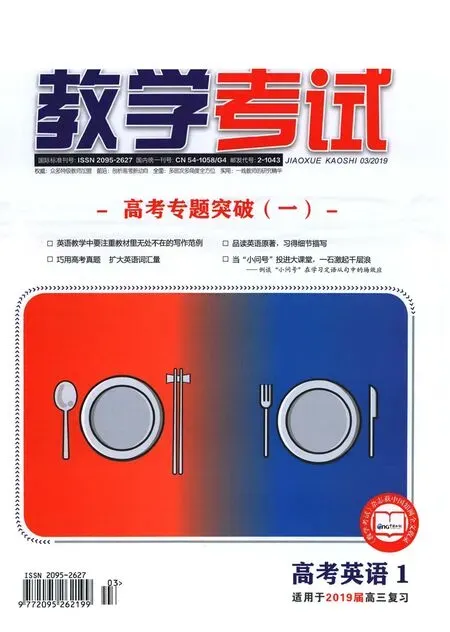状语从句必备知识、易错点和核心考点梳理
河南 (特级教师)
众所周知,语篇由句子组成。英语的句子既有简单句,又有复合句。复合句包括状语从句、名词性从句和定语从句三大类。高考对英语基础知识的考查主要集中在谓语动词、非谓语动词和复合句三大知识块上。历年的高考题非常重视对状语从句的考查,语法填空题、短文改错题都有涉及状语从句的考点。对状语从句的正确理解,可以帮助考生更好地理解语篇。在英语写作中,状语从句显得尤为重要。恰当地使用状语从句能使考生的英语写作档次提升,赢得阅卷老师的青睐,更容易得高分。
作为高考的高频考点之一,状语从句考点不容忽视。由于考生容易在状语从句知识点上出现错误,导致失分,使得该考点具有较好的区分度,一直受到命题人的青睐。本文拟梳理状语从句的必备基础知识、考生的易错点和高考核心考点。
一、状语从句必备知识
下面的思维导图清晰地呈现了状语从句考点的必备知识:

二、考生的易错点
状语从句的易错点通常有以下几处:
(一)until 的用法
1.如果主句的谓语动词为延续性动词,常用肯定式,表示主句的动作持续到某个时间结束。例如:
I just sat by the window watching the passing scene until I caught the eye of a waiter and ordered my meal.我只是坐在窗边看过往的景色,直到我看到一个服务员并点了饭菜。
2.如果主句的谓语动词为非延续性动词,常用否定式,表示直到从句的动作发生,主句的动作才发生,意为“直到……才……”。例如:
The villagers didn’t realize how serious the pollution was until all the fish died in the river.直到河里的鱼都死了,村民们才意识到污染有多严重。
3.“Not until+状语从句”位于句首,主句采用部分倒装。例如:
Not until she got home did Jenny realize that she had lost her necklace.直到回到家中,珍妮才发现她弄丢了项链。
4.如果把“not until+从句”放在强调句式中,主句不再采用倒装语序。例如:
It was not until I came here that I realized this place was famous for not only its beauty but also its weather.直到我来到这里,我才意识到这个地方出名不仅因为它的美丽,还因为它的天气。
(二)no sooner...than..., hardly/scarcely...when...的用法
no sooner...than..., hardly/scarcely...when...引导时间状语从句,意为“一……就……”,第一个分句常用过去完成时,第二个分句常用一般过去时。如果将no sooner,hardly, scarcely置于句首,第一个分句则采用部分倒装。例如:
The party had hardly started when Mary left.派对刚一开始,玛丽就离开了。
No sooner had we set out than it started raining.我们刚一出发,天就开始下雨了。
(三)状语从句的省略
如果主句和从句的主语相同,或从句的主语为it,且从句中含有be动词的某种形式。通常把状语从句中的主语和be动词省略,保留“连词+现在分词/过去分词/形容词/副词/介词短语”。例如:
While (I was)waiting for the bus to come, I bought a newspaper.等公交时,我买了一份报纸。
When (it is)completed, the museum will be open to the public next year.建成后,博物馆将在明年对公众开放。
I am going to the seaside for my holiday if (it is)possible.如果有可能,我打算去海边度假。
(四)几个易混句式的辨析
1.It is/was +时间点+when/before从句,意为“当某事发生时,时间是……”。例如:
It was midnight when they reached the town.他们在午夜到达这座小镇。
2.It is/was +介词+时刻+that+其他句子成分。这是一个强调句式,被强调部分为时间。例如:
It was at midnight that they reached the camp site.他们正是在午夜到达营地。
3.It will be/was+时间段+before从句,意为“过一段时间才……”;否定式表示“没多久就……”。例如:
It was some time before we found out the truth.过了一段时间,我们才查明真相。
It won’t be long before we meet again.我们不久就会再次见面的。
4.It is/has been+时间段+ since从句,意为“自从……发生以来,已经过一段时间了”,since时间状语从句中通常为非延续性动词。例如:
It has been a year since Charlie came to China.查理来中国已经一年了。
注意:如果since从句中为延续性动词,则表示“停止做某事已经多久了”。例如:
It has been three years since John worked here.约翰不在这里工作已经三年了。
5.It is (high)time + that从句,意为“真该做某事了”。在that从句中,谓语动词要用过去式,或用should加动词原形,但should不可省略。例如:
It is time that we should learn from our mistakes.现在是我们该吸取教训的时候了。
三、状语从句核心考点分析
(一)考查状语从句中连词的选择
1.条件状语从句
(1)_______ we don’t stop climate change, many animals and plants in the world will be gone.(2018年北京卷单项填空第2题改编)
【分析】句意:如果我们不抵制气候变化,世界上很多动植物将会消失。根据句意,空白处应填连词If,意为“如果”。
(2)_______ you can sleep well, you will lose the ability to focus, plan and stay motivated after one or two nights.(2018 年江苏卷单项填空第29题改编)
【分析】句意:如果你睡不好,一两个晚上之后你就不能专注、计划和保持活力。根据句意,空白处应填连词Unless,意为“如果不,除非”。
(3)Make sure you save all your work on screen ________the computer breaks down.(2018年3月天津卷单项填空第13题改编)
【分析】句意:确保保存你桌面上所有的文件,以防电脑系统瘫痪。根据句意,空白处应填连词in case/for fear that,意为“以免,以防”。
(4)You won’t find paper cutting difficult ________ you keep practicing it.(2015年北京卷单项填空第28题改编)
【分析】句意:只要/如果你继续练习,你就不会觉得剪纸很难学。根据句意,空白处应填连词so long as/as long as/if,意为“只要/如果”。
2.时间状语从句
(1)Last winter ______I went there again, they had a big separate house to raise dozens of chickens.(2018年全国卷Ⅰ短文改错改编)
【分析】句意:去年冬天,当我再次回去的时候,他们有一个单独的房子,里面养了几十只鸡。根据句意,空白处应填连词when/as,意为“当……的时候”。
(2)_______fat and salt are removed from food, the food tastes as if it is missing something.(2017年全国卷Ⅰ语法填空改编)
【分析】句意:当把油和盐从食物中去掉的时候,食物尝起来好像缺少点什么东西。根据句意,空白处应填连词When/As,意为“当……的时候”。
(3)______ the average age of the population increases,there are more and more old people to care for.(2016 年天津卷单项填空第7题改编)
【分析】句意:随着人口平均年龄的增长,有越来越多的老人需要照顾。根据句意,空白处应填连词As,意为“随着”。
(4)_______I started the car, my mind went blank.(2017 年全国卷Ⅰ短文改错改编)
【分析】句意:一旦我发动车,我的大脑一片空白。根据句意,空白处应填连词Once,意为“一旦”。
(5)We need to get to the root of the problem______ we can solve it.(2015年天津卷单项填空第12题改编)
【分析】句意:我们需要先找到问题的根源,然后才能解决它。根据句意,空白处应填连词before,意为“在……之前”。
(6)If you miss this chance, it may be years ____ you get another one.(2015年重庆卷单项填空第4题改编)
【分析】句意:如果你错过这次机会,要过很多年你才能再遇到这样的机会。题干中含有“it may be+时间段+before...”句式,表示“可能过一段时间才会(发生某事)”,因此空白处应填连词 before。
3.让步状语从句
(1)________ running regularly can’t make you live forever, the review says it is more effective at lengthening life than walking, cycling or swimming.(2018年全国卷Ⅰ语法填空改编)
【分析】句意:尽管经常跑步不能让你长生不老,但是这项综述说,它比散步、骑车或游泳更能有效地延长人的寿命。根据句意,空白处应填While/Though/Although,意为“尽管”。
(2)______ birds use their feathers for flight, some of their feathers are for other purposes.(2017年北京卷单项填空第25题改编)
【分析】句意:尽管鸟儿用羽毛来飞翔,但是它们的一些羽毛却派上其他用场。根据句意,空白处应填连词Although/Though/While,意为“尽管”。
(3)______ scientists have learned a lot about the universe,there is much we still don’t know.(2015年安徽卷单项填空第23题改编)
【分析】句意:尽管科学家对宇宙有所了解,但是我们仍有很多未知的东西。根据句意,空白处应填连词Though/Although/While, 意为“尽管”。
4.地点状语从句
(1)Located _______ the Belt meets the Road, Jiangsu will contribute more to the Belt and Road construction.(2017 年江苏卷单项填空第23题改编)
【分析】句意:处于一带一路的交汇点,江苏省将继续为一带一路建设做出更大贡献。根据句意,空白处应填连词where,意为“在……地方”。
(2)______ he once felt like giving up, he now has the determination to push further and keep on going.(2015 年安徽卷单项填空第34题改编)
【分析】句意:在他一度想放弃的地方,他现在下定决心要继续前行。 根据句意,空白处应填Where,意为“在……地方”。
(3)Half an hour later, Lucy still couldn’t get a taxi ____the bus had dropped her.(2014年重庆卷单项填空第14题改编)
【分析】句意:半小时以后,露西还在下公交车的地方,她乘不到出租车。 根据句意,空白处应填where,意为“在……地方”。
5.原因状语从句
I really enjoy listening to music _______ it helps me relax and takes my mind away from other cares of the day.(2016 年北京卷单项填空第33题改编)
【分析】句意:我非常喜欢听音乐,因为它帮助我放松,转移我的注意力。根据句意,空白处应填because,意为“因为”。
6.方式状语从句
_______ a single word can change the meaning of a sentence, a single sentence can change the meaning of a paragraph.(2015年浙江卷单项填空第9题改编)
【分析】句意:正如一个词语能够改变一个句子的意思,一个句子也能改变一个段落的意思。根据句意,空白处应填短语 Just as,意为“正如,就像”。
7.目的状语从句
Let’s not pick these peaches until this weekend ________they get sweet enough to be eaten.(2018年天津卷单项填空第4题改编)
【分析】句意:我们等到周末再摘这些桃子吧,这样吃起来才够甜。根据句意,空白处应填短语so that,意为“以便,以致于”。
8.比较状语从句
According to a review of evidence in a medical journal,runners live three years longer ______ non-runners.(2018 年全国卷Ⅰ语法填空改编)
【分析】句意:根据一项医学期刊的实例综述,跑步的人比不跑步的人寿命长三年。根据句中的比较级longer,可判断空白处应填连词than。
(二) 考查特殊句式
(1)It was only when the car pulled up in front of our house ________we saw Lily in the passenger seat.(2018年天津卷单项填空第14题改编)
【分析】句意:只有当汽车在我们的房子前停下来时,我们才看到莉莉坐在乘客席上。题干中含有强调句式,被强调部分是“only when the car pulled up in front of our house”,因此空白处应填that。
(2)It was when I got back to my apartment ______ I first came across my new neighbors.(2017年天津卷单项填空第11题改编)
【分析】句意:正当我回到公寓的时候,第一次偶遇新邻居。 题干中含有强调句式,被强调部分是“when I got back to my apartment”,因此空白处应填that。
(三)考查从句中的时态和语态
(1)We won’t start the work until all the preparations__________(make).(2014年天津卷单项填空第11题改编)
【分析】句意:直到做好所有准备工作,我们才会开始这项工作。在时间和条件状语从句中,如果主句为一般将来时,从句多用现在的某种时态,结合句意,谓语动词应用被动语态,因此空白处应填have been made。
(2)James has just arrived, but I didn’t know he _______(come)until yesterday.(2014年重庆卷单项填空第8题改编)
【分析】句意:James刚刚到达,但是直到昨天我才知道他要来。题干中含有not...until...句式,表示“直到……才……”。主句为一般过去时,从句应用过去将来时,故空白处应填was coming/would come。
(四)考查状语从句的省略
(1)If ______(accept)for the job, you’ll be informed soon.(2015年北京卷单项填空第31题改编)
【分析】句意:如果你被录用,你很快就会收到通知。分析句子结构可知,状语从句If (you are)accepted for the job省略了主语和be动词,因此空白处应填过去分词accepted。
(2)Children, when ______ (accompany)by their parents,are allowed to enter the stadium.(2014年湖南卷单项填空第21题改编)
【分析】句意:只有在父母的陪伴下,孩子们才能进入体育馆。分析句子结构可知,时间状语从句when (they are)accompanied by their parents中省略了主语和be动词are,因此空白处应填过去分词accompanied。
(五)考查倒装句
Only when Lily walked into the office ______ she realize that she had left the contract at home.(2015年天津卷单项填空第3题改编)
【分析】句意:当Lily走进办公室时,她才发现她把合同忘在家里了。Only+状语从句置于句首,主句应采用部分倒装,主句为一般过去时,故空白处应填助动词did。
通过梳理必备知识,我们对状语从句的基础知识成竹在胸;通过分析考点,我们了解了状语从句的命题方法和规律。只要考生掌握了正确的解题方法,就一定能攻克重点和难点,在高考中立于不败之地。

